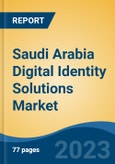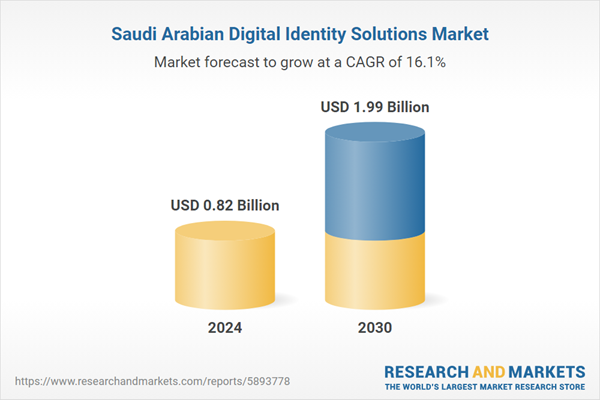Speak directly to the analyst to clarify any post sales queries you may have.
10% Free customizationThis report comes with 10% free customization, enabling you to add data that meets your specific business needs.
These solutions include biometric verification, facial recognition, digital ID cards, identity management platforms, and secure login protocols. They are widely applied in e-government services, banking, healthcare, telecom, and other sectors where user authentication and data protection are crucial. With the rise in digital transactions and cloud-based services, digital identity systems ensure a seamless and secure user experience while maintaining regulatory compliance.
The Saudi government has placed strong emphasis on developing a secure digital economy under its Vision 2030 strategy. Initiatives such as the National Digital Identity Platform and the efforts of the Saudi Data and Artificial Intelligence Authority (SDAIA) are driving the adoption of digital ID solutions. The expansion of e-services in healthcare, education, and public services has significantly increased the demand for secure identity verification mechanisms. Moreover, the integration of artificial intelligence and blockchain into identity systems is enhancing security, scalability, and trust.
As more sectors digitize and consumer expectations shift toward faster, safer online interactions, the market for digital identity solutions is expected to grow rapidly. Additionally, increased investment in cybersecurity, data protection regulations, and regional collaborations with global tech firms are accelerating innovation in this space. The market is well-positioned for sustained growth, driven by a digital-first policy environment, rising mobile adoption, and the critical need to combat identity fraud in an increasingly interconnected economy.
Key Market Drivers
Vision 2030 and Government-Led Digital Identity Infrastructure
Saudi Arabia’s Vision 2030 has acted as a pivotal force in reshaping the Kingdom’s digital landscape, placing secure digital identity at the center of its digital governance and public service transformation. The government, through agencies such as the Saudi Data and Artificial Intelligence Authority (SDAIA) and the National Information Center, has launched national initiatives like “Nafath” and “Absher” to establish a unified, secure, and scalable digital identity framework for all citizens and residents. These platforms allow users to authenticate themselves across hundreds of digital services, from public sector applications to financial and healthcare systems.By mandating digital identity verification in everything from tax filing to health insurance access, the Saudi government is building a trusted digital infrastructure that supports real-time identity validation. As more ministries digitize operations and push for cloud-native service delivery, the demand for robust identity platforms - including biometric, federated, and decentralized identity models - is accelerating.
This proactive policy orientation positions Saudi Arabia as a regional leader in government-led identity systems, encouraging long-term market investment and innovation in identity authentication and credential management. By early 2025, more than 28.5 million individuals in Saudi Arabia had enrolled in digital identity systems through national platforms like Absher and Nafath. This widespread adoption enables access to over 470 digital services across government and private sectors, significantly enhancing service delivery, streamlining administrative processes, and establishing a unified digital identity ecosystem across the Kingdom.
Key Market Challenges
Data Privacy and Regulatory Compliance Complexity
As Saudi Arabia accelerates the deployment of digital identity platforms, the complexity of ensuring data privacy and regulatory compliance has emerged as a significant barrier. The introduction of the Personal Data Protection Law (PDPL) requires public and private organizations to comply with strict data handling, consent, and processing guidelines.However, the rapid pace of digital transformation often outpaces regulatory enforcement mechanisms, creating gaps between technology implementation and legal adherence. Many enterprises, particularly in the private sector, face challenges in interpreting and operationalizing these new compliance mandates within their existing identity management frameworks. Additionally, discrepancies between regional and international standards pose difficulties for multinational firms operating in the Kingdom.
This regulatory landscape demands more than technical adjustments; it calls for a strategic overhaul of organizational data governance structures. Implementing consent-based identity verification, ensuring user data sovereignty, and maintaining compliance logs throughout the identity lifecycle require extensive investment in compliance technology and legal advisory resources. Furthermore, customer distrust regarding how personal identity data is stored and used can result in reduced adoption of digital identity services, especially in sensitive sectors like healthcare and finance. Balancing national security, user privacy, and seamless service access remains a delicate challenge that must be addressed through clearer legal frameworks, public-private partnerships, and enhanced citizen awareness.
Key Market Trends
Growing Adoption of Biometric-Based Identity Authentication
Saudi Arabia is witnessing a rapid shift toward biometric authentication technologies within its digital identity solutions market. Fingerprint scanning, facial recognition, iris detection, and voice authentication are being increasingly integrated into government platforms such as Absher and Nafath, as well as private sector applications in banking, healthcare, and telecom. This transition is driven by the need for more secure and user-friendly identity verification mechanisms that can reduce fraud and eliminate password dependency.Biometric technologies offer a distinct advantage in environments where security, speed, and accuracy are paramount. In sectors like banking and transportation, biometric ID is enabling contactless service access, secure transactions, and real-time verification. Government-backed smart city projects like NEOM are also prioritizing biometric identification for integrated access across healthcare, education, and mobility systems. This trend reflects the Kingdom’s broader push to create seamless, secure, and identity-centric digital ecosystems powered by human-centric data. As biometric infrastructure matures and public trust increases, its adoption is expected to become a standard across both public and private domains.
Key Market Players
- Thales Group
- NEC Corporation
- IDEMIA
- Microsoft Corporation
- SAP SE
- Oracle Corporation
- ForgeRock, Inc.
- OneSpan Inc.
Report Scope:
In this report, the Saudi Arabia Digital Identity Solutions Market has been segmented into the following categories, in addition to the industry trends which have also been detailed below:Saudi Arabia Digital Identity Solutions Market, By Component:
- Solutions
- Services
Saudi Arabia Digital Identity Solutions Market, By Deployment:
- Cloud
- On-Premises
Saudi Arabia Digital Identity Solutions Market, By Authentication Type:
- Single-factor Authentication
- Multi-factor Authentication
Saudi Arabia Digital Identity Solutions Market, By Enterprise Size:
- Large Enterprises
- SMEs
Saudi Arabia Digital Identity Solutions Market, By End User:
- BFSI
- IT & telecommunication
- Healthcare
- Government & Defense
- Energy & Utilities
- Others
Saudi Arabia Digital Identity Solutions Market, By Region:
- Northern & Central
- Southern
- Eastern
- Western
Competitive Landscape
Company Profiles: Detailed analysis of the major companies present in the Saudi Arabia Digital Identity Solutions Market.Available Customizations:
With the given market data, the publisher offers customizations according to a company's specific needs. The following customization options are available for the report.Company Information
- Detailed analysis and profiling of additional market players (up to five).
This product will be delivered within 1-3 business days.
Table of Contents
Companies Mentioned
- Thales Group
- NEC Corporation
- IDEMIA
- Microsoft Corporation
- SAP SE
- Oracle Corporation
- ForgeRock, Inc.
- OneSpan Inc.
Table Information
| Report Attribute | Details |
|---|---|
| No. of Pages | 85 |
| Published | July 2025 |
| Forecast Period | 2024 - 2030 |
| Estimated Market Value ( USD | $ 0.82 Billion |
| Forecasted Market Value ( USD | $ 1.99 Billion |
| Compound Annual Growth Rate | 16.0% |
| Regions Covered | Saudi Arabia |
| No. of Companies Mentioned | 8 |









